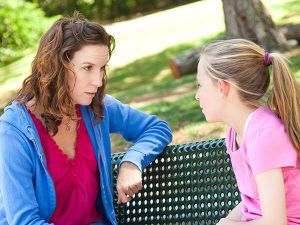Difference between revisions of "About-cancer/coping/adjusting-to-cancer/talk-to-children/zh"
(Created page with "'''关于巨蟹座'''") |
(Created page with "*您的孩子没有做过,没有想到或没有说过致癌的事情。 *仅因为您患有癌症并不意味着您会死于癌症。 实际上,许多人患癌症的时间...") |
||
| Line 12: | Line 12: | ||
'''关于巨蟹座''' | '''关于巨蟹座''' | ||
| − | * | + | *您的孩子没有做过,没有想到或没有说过致癌的事情。 |
| − | * | + | *仅因为您患有癌症并不意味着您会死于癌症。 实际上,许多人患癌症的时间很长。 |
| − | * | + | *您的孩子不能使您康复。 但是他或她有一些方法可以使您感觉更好。 |
| − | * | + | *科学家正在发现许多治疗癌症的新方法。 |
'''About Living with Cancer in the Family''' | '''About Living with Cancer in the Family''' | ||
Revision as of 21:07, 31 October 2019
Contents
与孩子谈论您的癌症
即使您的孩子在得知您的癌症时会感到沮丧,也不要假装一切都好。 甚至很小的孩子也可以感觉到什么时候出了问题。 他们会看到您感觉不舒服,经常离开家,或者不能像以前那样花很多时间陪伴他们。 年仅18个月的儿童开始注意到周围发生的事情。 诚实很重要。 说实话比让他们想象最坏的情况要好。 给您的孩子一些时间来提问和表达他们的感受。
所有年龄段的孩子都需要知道什么
关于巨蟹座
- 您的孩子没有做过,没有想到或没有说过致癌的事情。
- 仅因为您患有癌症并不意味着您会死于癌症。 实际上,许多人患癌症的时间很长。
- 您的孩子不能使您康复。 但是他或她有一些方法可以使您感觉更好。
- 科学家正在发现许多治疗癌症的新方法。
About Living with Cancer in the Family
- Your child is not alone. Other children have parents who have cancer.
- It's okay to be upset, angry, or scared.
- Your child can't do anything to change the fact that you have cancer.
- Family members may act differently because they're worried about you.
- You will make sure that your children are taken care of, no matter what happens to you.
About What They Can Do
- They can help you by doing nice things like washing dishes, cleaning their room, or even drawing you a picture.
- They should still go to school and take part in sports and other fun activities.
- They can talk to other adults for support, such as teachers, family members, and religious or spiritual leaders.
How Kids May Act When You Have Cancer
Children can react to cancer in many different ways. For example, they may:
- Be confused, scared, lonely, or overwhelmed
- Feel guilty and think that something they did or said caused your cancer
- Feel angry when they are asked to be quiet or to do more chores around the house
- Miss the amount of attention they're used to getting
- Regress and behave as they did when they were much younger
- Get into trouble at school or at home
- Be clingy and afraid to leave the house
- Learn what can help children and teens who have a family member with cancer.
Teens
If you have a teenager, know that they're at a time in their lives when they're trying to break away and be independent from their parents. Try to get them to talk about their feelings and ask questions. Tell them as much as they want to know about your cancer. Ask them for their opinions and, if possible, let them help you make decisions.
Teens may want to talk with other people in their lives. Friends can be a great source of support for them, especially those who also have a serious illness in their family. Other family members, teachers, coaches, and spiritual leaders can also help. Encourage your teenage children to talk about their fears and feelings with people they trust.
For more information about support for teens, you may find it helpful to share this e-book When Your Parent Has Cancer: A Guide for Teens with them.
Adult Children
If you have adult children, your relationship with them may change now that you have cancer. You may:
- Ask them to help with making health care decisions, paying bills, or taking care of the house
- Ask them to explain medical information
- Need them to go to the doctor with you or pick up medicines
- Rely on them for emotional support
- Feel awkward when they help with your physical care
For some parents, it may be hard to ask for comfort and care from their grown children. But it's important to talk about cancer with your family members, even if they get upset or worry about you. Try to include them when talking about your treatment. Let them know the choices you would like them to make about your care, in case you're too sick to make the choices yourself. (See Advance Directives.) Recognize that it may be hard for your children to have this talk and that, like you, they're trying to adjust to your illness.
For more details and age-related tips on talking to kids, your family and friends may find it helpful to read the NCI booklet, When Someone You Love Is Being Treated for Cancer.
